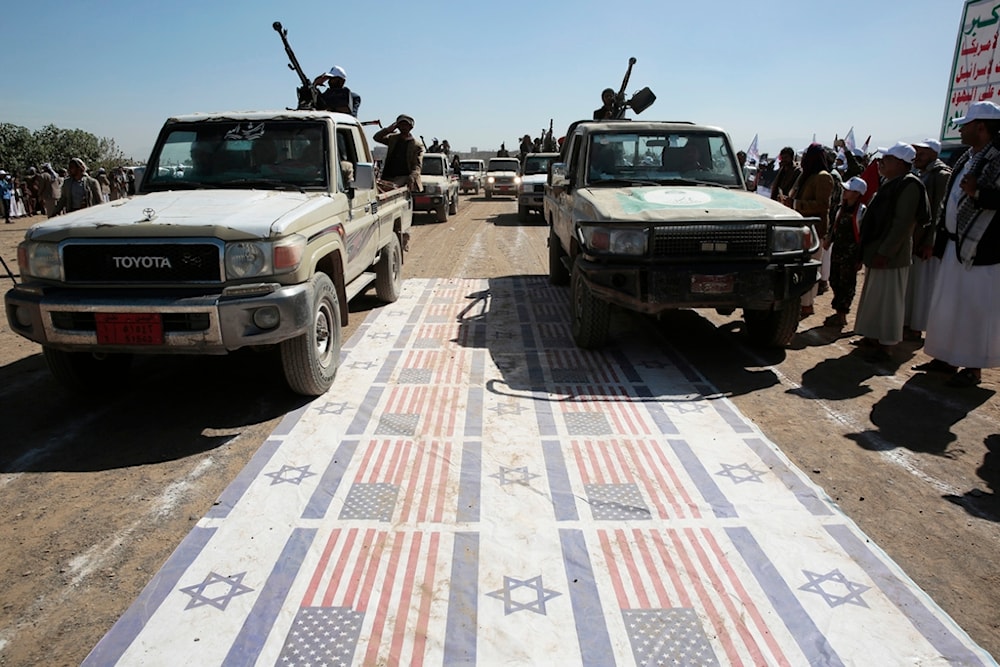How Ansar Allah are schooling the West on the battlefield: Bloomberg
An opinion piece published in Bloomberg details the significant challenges the Yemenis pose against the Western maritime coalition, giving them the upper hand in battle.
-

Ansar Allah fighters stage a rally against the U.S. government designating Ansar Allah as a terror group and against the U.S.-led sustained airstrikes on Yemen, near Sanaa, Yemen, January 25, 2024. (AP)
A recent op-ed published by Bloomberg detailed the considerations the West must take into account in its war on Yemen and schooled the West on the challenges it has to face before declaring itself victorious against a movement it cannot catch up to, Yemen's Ansar Allah.
Throughout the confrontations between Ansar Allah and the foreign infiltrative coalition in the Red Sea, author Marc Champion reflects on the military advancements the Yemenis possess. The Yemenis revolutionized the battlefield by utilizing enhanced weapons such as precision missiles and suicide drones, among others, that had only been available to the richest nations.
The second challenge encompasses the vulnerability of Western nations that have perpetuated a war without calculating all they would lose. For example, Champion discusses the infrastructure of the United States and its offshore projects that could be shrunk in the face of a powerful foe. He proceeds to speculate how much the US per capita gross domestic product, which stands at over $76,000, could be hit, highlighting its fragility.
The economic structure of the globe should be considered, according to Champion, who claims the disruptions in the maritime supply chain caused by Yemen's Ansar Allah, which add up to 12% of the global shipping, essentially do not affect Yemen as much as they affect European importers.
Moreover, the author depicts the discrepancies between the political ideology of the US and Yemen. If Yemen kills US troops that have been deployed to infiltrate and militarize the Red Sea and protect the interests of "Israel" by bombing the defensive force that is supporting Gaza through a US-funded Israeli genocide, then it would transpire as a political problem that backfires at Biden's administration. On the other hand, when US troops kill Yemeni civilians in the US' brutal attacks on residential Yemeni areas, then it only fuels Ansar Allah further, and more so the popular support it garners.
Champion then says the US must not escalate tensions against a clearly overpowered movement that regards it as an absolute evil and continues to recruit freedom fighters in the quest for liberation.
Read more: Much of Yemeni offensive capability is intact after US-led strike: NYT
Yemen refutes the undersea cables matter once again
On submarine telecommunication cables, the author classifies them as an extension of Western vulnerabilities in the region, that could be a target for the Yemenis.
It is important to note that Ansar Allah has repeatedly declared its intention to preserve and protect the cables. Earlier in March, the Ministry of Transport and Maritime Affairs in Yemen reiterated that Sanaa "is keen on the security and safety of undersea cables in Yemeni waters, in accordance with international laws, treaties, and agreements."
It pointed out that "the Republic of Yemen is also keen on the interests of the countries associated with the cables as obligated by laws, agreements, international treaties, and the common interests between Yemen and other states."
This comes after Israeli newspaper Globes reported earlier that at least four underwater communication cables were damaged in the sea between Jeddah in Saudi Arabia and Djibouti in East Africa, accusing the Yemeni Armed Forces of allegedly being behind the operation.
Sanaa rejected claims made by the United States and Britain regarding the cutting of undersea cables in the Red Sea and condemned the act of sabotage, describing it as "criminal". The Yemeni government in Sanaa affirmed on Saturday that the US-UK aggressions against the country have disrupted the undersea cables, jeopardizing the security and safety of international communications.
Read more: Yemen honored to fight for Gaza: Sayyed al-Houthi
The unstoppable Ansar Allah
Previously, a piece published on The Atlantic magazine's news website suggested that Yemeni Ansar Allah leader Sayyed Abdul-Malik al-Houthi "may now be the most popular public figure in the Middle East."
The piece pointed out that since the Yemeni Armed Forces began their operations in the Red Sea in November in support of the Palestinian people, Sayyed al-Houthi "has been treated like a latter-day Che Guevara, his portrait and speeches shared on social media across five continents."
It emphasized that although it remains challenging to assess the consequences of the attacks, the Yemeni operations created a gap in the global economy.
The operations, according to the piece, turned the Yemeni Ansar Allah movement into "heroes for Arab and Muslim youths who embrace the Palestinian cause," and even influenced Western progressives.
Elsewhere, the piece indicated that the US-British aggression did not deter the Yemeni Armed Forces, adding that "since staking claim to the Palestinian cause," the Yemeni forces "have come to seem unstoppable."

 5 Min Read
5 Min Read








